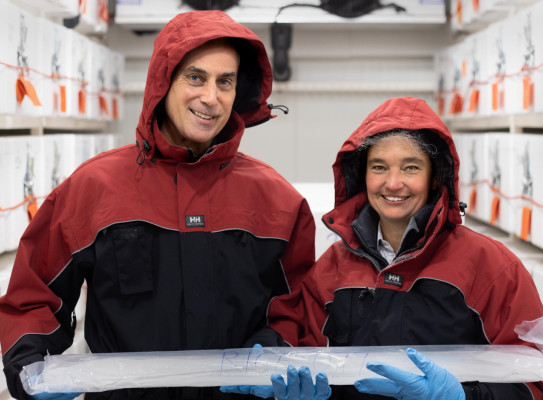Climate change work awarded 2019 PM’s Science Prize

GNS Science is proud to be part of the Melting Ice and Rising Seas team that was awarded the Prime Minister’s Science Prize for 2019. The project is a ground-breaking collaboration tackling the link between climate change, Antarctic ice melt, and sea level rise.
The multi-institutional team is led by Victoria University of Wellington (VUW) and includes Nancy Bertler, Richard Levy, and Liz Keller of GNS Science, and researchers from VUW and NIWA.
Using geological data from past intervals of warm climate, modern glacial observations, and computer models, the team has shown that the West Antarctic Ice Sheet is highly sensitive to rising ocean temperatures. They have also shown that large regions of Antarctica’s ice sheets will retreat if our carbon dioxide emissions continue to rise such that the global temperature increase exceeds 2 degrees Celsius.
The impact of this melt and resulting sea level rise on Aotearoa New Zealand’s coastline will be large, with significant impact on our coastal communities and environments
The team’s research also suggests that if our climate system warms beyond 2 degrees, the ice will begin to retreat and cannot be stopped. This will commit the planet to many metres of sea level rise.
“These results emphasise that our choices right now will have significant consequences, not only for the coming decades but for centuries and millennia,” Dr Levy says.
The Prime Minister’s Science Prize is awarded for a ‘transformative scientific discovery or achievement, which has had a significant economic, health, social, and/or environmental impact on New Zealand’. The award reflects not only the world-class scholarship of the team, but also the impact and influence of their work.
Prime Minister's Science Prize Winner transcript
The research and expertise of the team is markedly improving Aotearoa New Zealand’s ability to manage impacts of sea level rise. Their work is incorporated into our national Coastal Hazards Guidance and is being used by local government, iwi and other stakeholders across Aotearoa New Zealand. The team’s contributions are being enhanced through new research conducted under the Antarctic Science Platform, Resilience to Nature’s Challenges and Deep South National Science Challenges, and NZ SeaRise Programme.
In the wake of the COVID-19 pandemic, governments around the world have committed to unprecedented stimulus packages. It is critical that potential climate change impacts are considered, and expert advice will be central to ensuring economies put sustainability front and centre as they rebuild.
“The team’s research confirms the consequences of not doing so could be catastrophic for future generations,” says Dr Levy.
The group will invest $400,000 of its prize to fund scholarships in perpetuity for PhDs.

